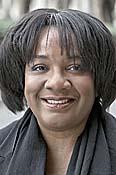Ms Diane Abbott, British Labour Party’s Member of Parliament for Hackney North and Stoke Newington, on Tuesday met with key women's advocacy and activist groups to interact and learn more about their participation in Parliament.
Ms Abbott, who is currently the Shadow Secretary of State for International Development, is on a week-long visit to share her experiences in her long political career and also hear from her Ghanaian counterparts, in order to build closer networking relationships and support for each other.
The meeting, which was organised by the African Women’s Development Fund (AWDF), opened doors for participants and their visitors to delve into the various achievements and also the challenges that confronts Ghanaian women in their pursuit to achieving equal access and recognition at the decision-making levels.
Some of the tremendous achievements echoed by the Ghanaian groups include the passage of various legislation including the Domestic Violence, and Disability Bill, to provide a voice for the marginalized in the society.
They said the development of the Women’s Manifesto, has served as a reference for political engagements and the progress chalked were as a result of the instrumental efforts of the various women’s Organisations.
They, however, cited challenges such as the low morale of women to enter into politics, stigma, lack of finance, negative traditional barriers, limited exposure, lack of recruitment avenues and support systems, the hostile political terrain as well as gaps in the political system, as the setbacks to full participation of women in the governance system of the country.
They complained that women were currently overburdened and bearing the weight created as a result of the poor and failing economic and leadership shortfalls, which to a large extent contributes to their lack of interest in politics.
Ms Abbott admitted that some of the challenges were peculiar to women globally, but advised that long-term investment in women be targeted to build or create a wealth of generation to take part in active politics and governance.
She suggested that access to finance and targeted aid must be keenly pursued as two key areas to push ahead the agenda of gender equality in decision making in Africa.
She also encouraged enhanced education for women to awaken their passion in politics and social recognition, in order to increase their current abysmal number of representation both in Cabinet and in Parliament.
Madam Theo Sowa, Chief Executive Officer of the AWDF, gave a brief history of the Organisation which was inspired by the aspirations of the African women’s movement, some 15 years ago.
She said AWDF was created as an independent resource for gender equality and development across the continent, and as grant making practices built to support the initiatives of African women who may not have access to mainstream funding due to capacity, language, location, and marginalisation.
The Fund, she said supports local, national and regional women’s organizations working towards the empowerment of African women and the promotion and realization of their rights.
Politics of Thursday, 18 February 2016
Source: GNA
British MP interacts with Ghanaian women activists
 Ms Diane Abbott, British Labour Party
Ms Diane Abbott, British Labour Party
















